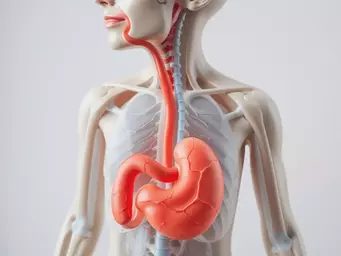Lifestyle Changes for Acid Reflux

Feeling that burning sensation in your chest? You’re not alone. Acid reflux can disrupt daily life, and knowing what triggers it is the first step toward relief. Discover how lifestyle changes and understanding the condition can empower you to take control of your health.
What You Will Learn
- Acid reflux is caused by factors like obesity, diet, and a weakened esophageal sphincter.
- Common symptoms include heartburn, regurgitation, and difficulty swallowing.
- Gastroesophageal Reflux Disease (GERD) is a more serious form of acid reflux, characterized by frequent symptoms.
- Lifestyle changes, such as eating smaller meals and avoiding late-night snacks, can help manage symptoms effectively.
- Maintaining a healthy weight and practicing mindful eating are crucial for reducing acid reflux symptoms.
- Tracking your meals and symptoms can provide valuable insights into triggers and effective management strategies.
Understanding Key Factors in Acid Reflux Management
Effective management of acid reflux often involves a combination of dietary adjustments, weight control, and behavioral changes. The visual below highlights these critical areas as discussed in the article.
Understanding Acid Reflux and Its Impact on Daily Life
Acid reflux, often experienced as a burning sensation in the chest, is a common issue that affects many individuals. It occurs when stomach acid flows back into the esophagus, leading to uncomfortable symptoms and potential complications. Understanding the causes and symptoms of acid reflux is crucial for effective management and relief.

Many of you might wonder why this happens. Factors such as diet, obesity, and certain medical conditions can contribute to acid reflux. Common symptoms include heartburn, regurgitation, and difficulty swallowing. Identifying these signs is the first step toward finding relief and improving your quality of life.
Defining Acid Reflux: Causes and Symptoms
When we talk about acid reflux, it’s essential to recognize the underlying causes. These can include:
- Weakness of the lower esophageal sphincter (LES)
- Hiatal hernias
- Pregnancy
- Certain medications
- Obesity
Each of these factors can lead to the symptoms we dread. Heartburn is the most common symptom, but others, such as chronic cough or a sour taste in the mouth, can also indicate reflux issues. If you find yourself experiencing these symptoms regularly, it's time to explore potential triggers and solutions!
Gastroesophageal Reflux Disease (GERD): A Deeper Look
While many people experience occasional acid reflux, some develop a more serious condition known as Gastroesophageal Reflux Disease (GERD). This occurs when acid reflux happens more than twice a week, leading to significant discomfort and potential complications. You can find more detailed information about GERD and its management from authoritative sources like gi.org and Mayo Clinic.
GERD can affect your daily life, making it important to recognize its symptoms, which may include:
- Persistent heartburn
- Difficulty swallowing
- Chest pain
- Hoarseness or a sore throat
If you suspect you have GERD, consulting with a healthcare professional can help you develop an effective management plan tailored to your needs. Remember, understanding your symptoms is the first step toward taking control of your digestive health!
Frequently Asked Questions About Acid Reflux
What is acid reflux?
Acid reflux occurs when stomach acid flows back into the esophagus, causing a burning sensation in the chest and other uncomfortable symptoms.
What are the common causes of acid reflux?
Common causes include a weakened lower esophageal sphincter (LES), hiatal hernias, pregnancy, certain medications, and obesity.
What are the main symptoms of acid reflux?
The main symptoms are heartburn, regurgitation, and difficulty swallowing. Other symptoms can include chronic cough or a sour taste in the mouth.
How is GERD different from acid reflux?
While acid reflux is occasional, GERD (Gastroesophageal Reflux Disease) is a more serious condition where acid reflux occurs more than twice a week, leading to persistent discomfort and potential complications.
What lifestyle changes can help manage acid reflux?
Effective lifestyle changes include eating smaller, more frequent meals, avoiding late-night snacks, staying upright after meals, maintaining a healthy weight, adopting a balanced diet, and practicing mindful eating. For more strategies, refer to resources like NYU Langone.
How Lifestyle Affects Acid Reflux Management
Making lifestyle changes can significantly impact the frequency and intensity of acid reflux symptoms. Some strategies I recommend include:
- Eating smaller, more frequent meals
- Avoiding late-night snacks
- Staying upright after meals
- Maintaining a healthy weight
Incorporating these changes into your daily routine can create a more comfortable digestive experience. As you navigate your journey with acid reflux, remember that small adjustments can lead to big improvements in your overall well-being. How will you start making these changes today?
We Want to Hear From You!
What lifestyle changes have you found most effective in managing your acid reflux symptoms? Share your thoughts below:
Summarizing Key Lifestyle Changes to Support Acid Reflux Treatment
Making lifestyle changes is crucial when managing acid reflux effectively. Through a combination of diet modifications, weight management, and behavioral adjustments, you can significantly reduce your symptoms and enhance your overall well-being. At What is Acid Reflux, we advocate for a holistic approach that empowers individuals to take control of their digestive health.

Here are some essential lifestyle changes to consider:
- Adopt a balanced diet rich in whole foods and low in trigger ingredients.
- Maintain a healthy weight to reduce pressure on your stomach.
- Practice mindful eating to improve digestion and minimize discomfort.
These adjustments can create a ripple effect on your digestive health and daily life. It’s all about finding the right balance that works for you!
Balancing Diet, Weight, and Behavioral Adjustments
Achieving a balance between your diet, weight, and behavior is vital in managing acid reflux. By integrating these elements into your lifestyle, you build a solid foundation for ongoing relief. For instance, embracing a Mediterranean diet can provide not only delicious meals but also essential nutrients that promote digestive health.
To effectively balance these aspects, consider the following:
- Prioritize meals that are high in fiber and low in fat.
- Engage in regular physical activity to support weight management.
- Monitor portion sizes to avoid overwhelming your digestive system.
Making these changes may seem daunting, but remember that small, gradual adjustments can lead to lasting improvements. Celebrate every little victory along the way!
Encouragement for Sustainable Lifestyle Modifications
Staying committed to lifestyle modifications can sometimes feel challenging. However, with the right mindset and support, you can make these changes sustainable. At What is Acid Reflux, we believe that empowering yourself with knowledge is a key factor in your success. Remember, progress takes time!
Here are some supportive strategies to help you stay on track:
- Set realistic goals to avoid feeling overwhelmed.
- Keep a food diary to track your meals and symptoms.
- Connect with others who share similar experiences for motivation.
By focusing on these strategies, you’ll find it easier to incorporate changes into your daily routine. Your journey toward better digestive health is not just about treatment; it's about creating a lifestyle that nurtures your well-being!
Recap of Key Points
Here is a quick recap of the important points discussed in the article:
- Acid reflux is primarily caused by factors such as weakness of the lower esophageal sphincter, hiatal hernias, obesity, and certain medications.
- Common symptoms include heartburn, regurgitation, and difficulty swallowing, with GERD being a more serious condition if symptoms occur frequently.
- Lifestyle changes, such as eating smaller meals, avoiding late-night snacks, and maintaining a healthy weight, can help manage acid reflux symptoms effectively.
- Adopting a balanced diet rich in whole foods and engaging in regular physical activity are essential for long-term relief and digestive health.
- Keeping a food diary and connecting with others facing similar challenges can provide motivation and support during your management journey.









